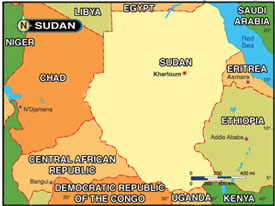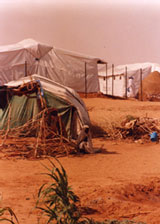FCNNEWSSOURCE
One on One with Attorney Lewis Meyers
Sudan says US armed Darfur rebels (Daily Times)

(FinalCall.com) – Lewis Meyers has been a human rights and civil rights lawyer for almost 32 years. He first began traveling to Africa in 1976, when he attended a conference of the Organization of African Unity, as a member of an African American group seeking to get NGO status with the OAU. In 1988, he traveled to Angola’s war zone as a part of a fact-finding mission sponsored by the United Church of Christ and the Commission for Racial Justice. He recently traveled to the Sudan as a member of a fact-finding mission called by the Honorable Minister Louis Farrakhan on the crisis in Darfur. After a busy day in court and in the classroom, the professor of Law at Kennedy King College spoke with Final Call Managing Editor Dora Muhammad on his legal concerns about the crisis in the Sudan.

Final Call (FC): In considering the legal issues surrounding the crisis in Darfur, what are the main concerns?
Lewis Meyers (LM): From a legal standpoint, there are four things that we all should be concerned about. First of all, on July 30, 2004, the United Nations Security Council passed Resolution 1556, essentially giving the Sudanese 30 days to take some actions to prevent what the United Nations considered to be the lawlessness involving the janjaweed. The second issue was whether the actions of the Sudanese government in any way constituted genocide under the terms of the 1948 Geneva Conventions adopted by the United Nations.
The third issue was the recent resolution passed by the United Nations Security Council threatening sanctions against the Sudanese government. In fact, they mentioned the possibility of cutting off the petroleum oil and one other thing. And then the fourth issue is the general question of whether what is going on in Darfur now violates the United Nations Charter in regards to human rights.
FC: Do you believe that the crisis in Darfur constitutes genocide?
LM: I do not believe, under the United Nations Charter and under the 1948 Convention on Genocide, that the United States has made a credible case for genocide, as genocide is defined by the United Nations and the Geneva Convention. I do not believe that there has been a systematic attempt by the Sudanese government to ethnically cleanse or exterminate a specific group, tribe or a set group of countrymen.
However, and this is important, I do believe there’s credible information that people have been, in this war, killed, wounded and maimed by forces that may or may not have been involved with the Sudanese army, mainly the janjaweed. As a human rights advocate and a human rights lawyer, I am concerned about the Sudanese people who have been victimized through this war process in Darfur. Based on the people that we interviewed in the two camps that we went to, there’s some credible information that concerns me about whether or not the janjaweed has committed human rights violations. That matter certainly has to be looked into by the international community more carefully.
FC: What role can and should the African Union play in resolving this crisis?
LM: I think that the African Union is the forum to resolve the contradictions and problems within Sudan at this moment. I believe that the problems of Africans should first, if possible, be resolved by Africans. I believe that the African Union is sufficiently concerned about the allegations of human rights abuse and the charge of genocide to do a credible investigation and take appropriate actions to address those charges.
In that regard, I believe that the Sudanese government should agree, not only to increase the number of monitors there at the behest of the African Union now, who are protecting the relief workers and the United Nations personnel, but I also believe that the current role that the African Union is playing, while important and significant, should be expanded to include not just monitoring, but also possibly a peace keeping operation.
The peacekeeping operation would principally involve separating the existing forces, particularly in Darfur since the peace talks have broken down in Abuja and the Sudanese Liberation Movement (SLM) and the Justice and Equality Movement (JEM) have essentially said that they were returning to the battlefield. There’s going to have to be a third force to try and separate the warring parties and that force should probably be the African Union. The United Nations should be deferred to the African Union and the African Union should be in that process, as opposed to the threat hanging over the Sudanese government from the United Nations. The United Nations should really be deferring to the African Union.
FC: What is the most important issue for the American public?
LM: The most important issue for the American public is the question of whether the United States is violating the United Nations Charter by interfering in the internal affairs of the Sudanese government. I believe that Secretary of State Colin Powell and the United States Central Intelligence Agency (CIA), along with other U.S. intelligence agencies, have been and currently are very much involved in what is happening in the Sudan, both in terms of the North/South dispute as well as the most recent problems in Darfur.
I believe the best kept secret has been the hidden hand of the United States government, financing, funding and arming third party countries to facilitate and perpetuate the war hitting Sudan. There needs to be an independent investigation of our intelligence coordination, against insurgent groups in the country.
It is hypocritical for the United States government to speak of genocide and human rights abuses by the Sudanese government when, at the same time, they are covertly funding the insurgence and rebel groups in the country opposed to the government, which only serves to perpetuate the murder, the mayhem and the destruction of the human rights of the Sudanese people.
To the extent that the U.S. government has participated in doing this, they have perpetuated the war in the country and they have violated the United Nations Charter by interfering in the internal affairs of a sovereign nation without any credible or legal justification. While Americans should certainly be concerned about the pillage, carnage, deaths and the human rights abuses in the Sudan, we should be equally concerned about our government’s covert involvement in perpetuating what is going on. That is a legal issue that should be addressed in the context of the overall problems facing the Sudan today.
FC: Is peace possible?

LM: The African Union has the responsibility to get the now-failed peace talks in Abuja involving Darfur back on track. The Sudanese government has the responsibility of being open and making every available effort to facilitate those talks getting back on track. The peace and reconciliation negotiations in the civil war between the north and south in Nairobi involve six protocols. When the delegation met with the official from the Center for Strategic Studies, he was also one of the chief peace negotiators. They had concluded, basically, everything in the peace negotiations, but there were some technical issues that they had left to resolve, nothing major.
One of the things that had been concluded was an arrangement with the Sudanese Peoples’ Liberation Army (SPLA) where they would have elections and their own government in the area and that government would be a part of what they call a federal system. Most importantly, the Sudanese government had agreed to, I believe in the year 2006, allow the southern Sudanese to have a referendum on whether they wanted to be independent. If they voted for independence, then the country would be split. Now, that’s a major concession, which at least begins to show some flexibility on the part of the Sudanese government. Since those protocols were almost complete–which meant that that problem North/South, was about to be concluded–all parties to that should be encouraged to get back to the table, notwithstanding Darfur.
My concern is the reason why the talks broke down in Abuja was because Colin Powell strategically decided to announce America’s claim of genocide while these crucial negotiations were going on with the rebel faction in Darfur. He decided to do that to wreck the only real chance of peace in that region. The reason why they left the peace table is because the U.S. administration’s position gave them hope that if they pulled out, that would be the strategic thing to do because America and the world would turn against the government. Therefore, why would they negotiate when it looks like the government was on the ropes? Again, America’s involvement in disrupting that process was not coincidental.
FC: Kofi Annan said recently that, if an investigation into the crisis in Darfur determined that the acts constituting genocide had occurred, that it would be the very first time that the Security Council would actually act upon the Convention against Genocide. Said simply, what is the difference on the spectrum of human rights violations to the full extent of genocide?
LM: That’s correct. Human rights abuses can be both selective as well as individual, which means that conceivably groups can be the victims of human rights abuses. Let me give you the most glaring example that nobody talks about: It is very difficult for the American government to deny African Americans.
Need I remind interested human rights advocates that, until 1954, racial apartheid was legal in America? Need I remind people in this country that Blacks were targeted as a group? We were denied our fundamental equal rights as citizens based on race. That is what you call a systematic and methodical process of denying a specified group of people certain human rights.
In the United States, it was documented that between 1868 and practically 1968, there was a systematic pattern of lynching in America that was documented by the United States Congress that one could arguably claim was a genocidal pattern on the part of the American government. Because that conduct was passively approved by the government, there were a number of attempts in the Congress to outlaw lynching. If you check the records, the American Congress declined and refused to ever vote an anti-lynching bill in this country. Although there were documented cases of lynching and Blacks being targeted for specific human rights abuses as a group and a race, yet America never sought to set that straight by outlawing it.
So upwards to 1948, when the Geneva Convention protocols and the genocide was adopted and written into the United Nations Charter and Declarations, America had the best example of what it was like to systematically target a group. In fact, the two countries that stand alone, up until 1994, were America and South Africa. Although America in 1954, on paper, said that Jim Crow “Separate and Equal” was actually unequal, nobody denied that from 1964 to practically until today Blacks, as a group, are still targeted for racially discriminatory acts.
So, it’s a bit hypocritical to see the great grandson of a Caribbean slave on CNN speaking of genocide in the Sudan, outside of the context of the human rights abuses and genocidal acts of his own government against his own people. I am a bit amused by that, because if you want to put this thing in some real perspective, then you have to look at the total picture. Don’t just take the Sudan out of context because, as we stand today, nobody knows better than Colin Powell what it’s like to be a part of a specific group targeted by another group based on skin color, to be denied basic fundamental human and civil rights.
(To be continued, next week, along with more coverage on the fact-finding mission to Darfur.)












